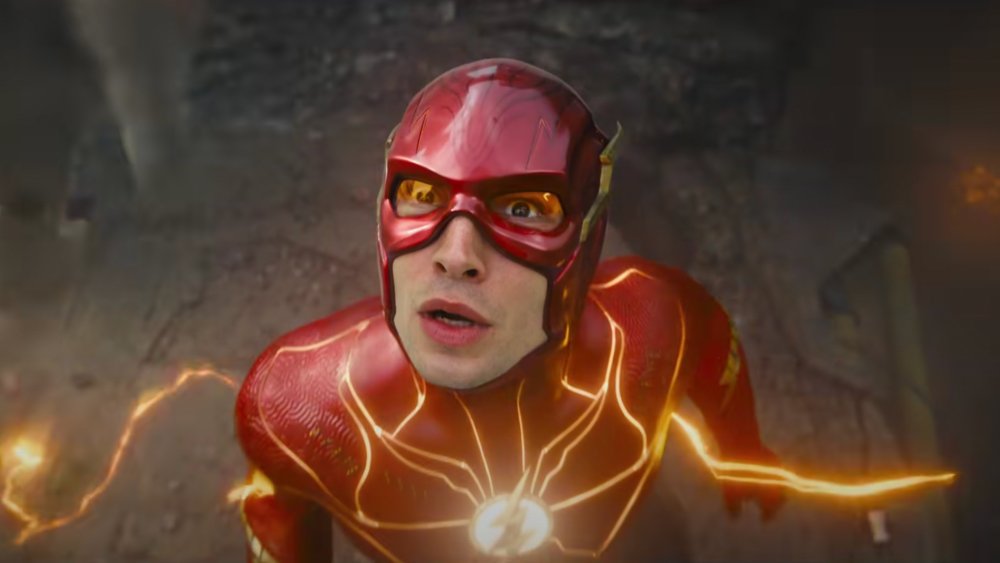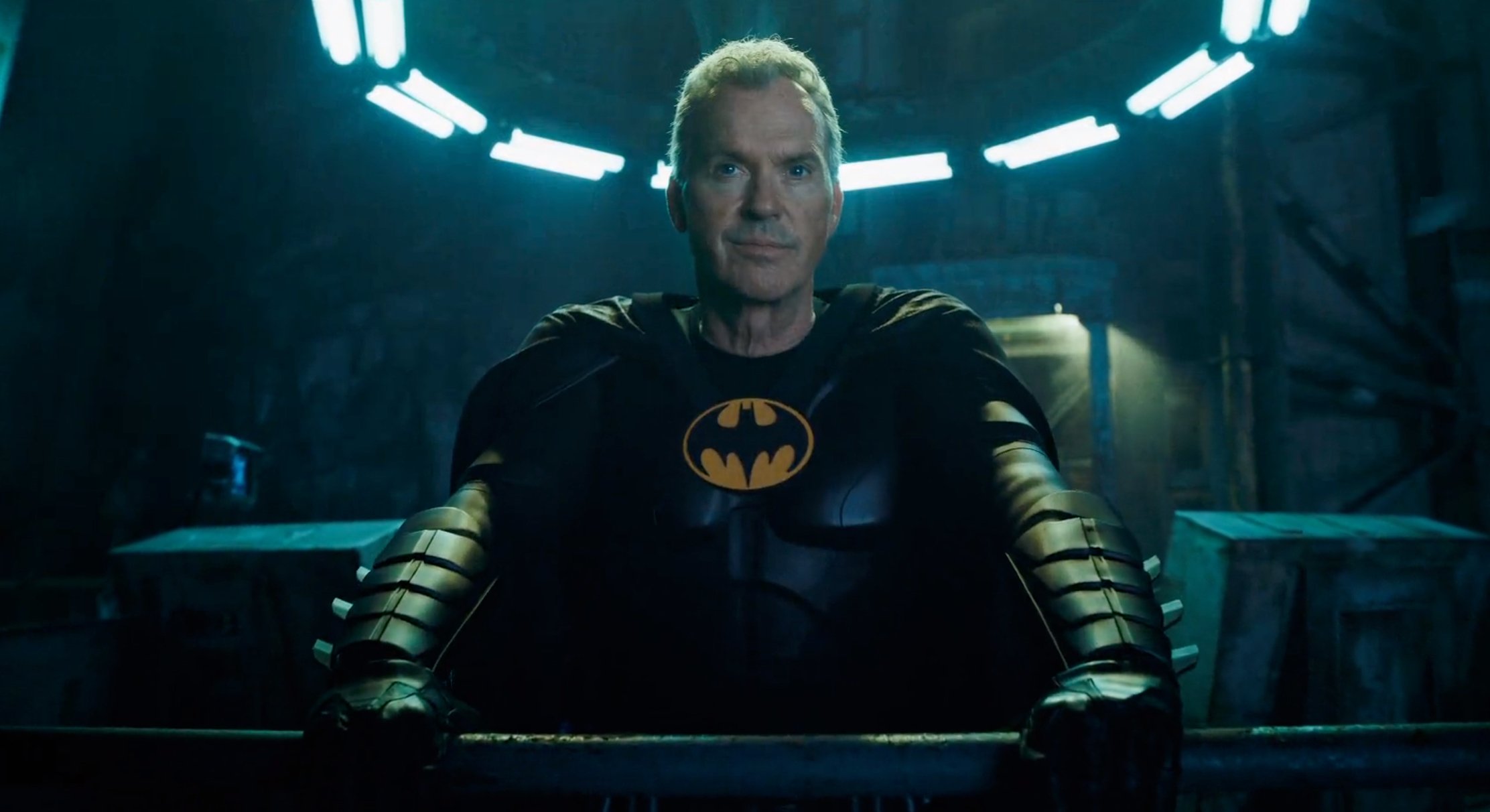As I wrote in my recent review of Coherence, the multiverse is all the rage, right now. That goes doubly for superhero films. Andy Muschietti’s DCEU course correction The Flash is the latest masked vigilante blockbuster to utilize the brainy sci-fi concept to deploy some fan service and capitalize on the increasing sophistication of audiences that have now experienced about three distinct eras of comic book films. There’s been talk recently of “superhero fatigue,” and I think this trend is partly a way for the studios to goose box office returns while providing in-universe explanations of recasting headlining roles in the never-ending quest for truth, justice, and robust intellectual properties. At the end of the day, though, you either like these films or you don’t. I won’t begrudge your opinion, but as a lifelong comic nerd, I’ve been all in on the genre for over four decades.
The story holds many surprises, so I’m just going to sum up the basics of the plot. Barry Allen aka the Flash (Ezra Miller, reprising their role from previous DCEU entries) is still intent on clearing his father’s name for the murder of his mother. When he’s not poring over the details of the case, he assists Batman (Ben Affleck) and other members of the Justice League, though he’s not altogether happy with his role in that pantheon. After discovering he essentially has the ability to time travel deep into the past, he decides to alter history to prevent his mother’s death. This, of course, has unintended consequences as Barry will need help from a younger version of himself (Miller doing double duty), an alternate universe version of Batman (Michael Keaton, returning to his beloved role after a thirty-one-year hiatus), and Supergirl (Sasha Calle) to set things right while also dealing with the consequences of a world where Superman doesn’t exist.
Other notable roles include Michael Shannon as the fearsome General Zod, Jeremy Irons as Alfred Pennyworth, Kiersey Clemons as Iris West, Temuera Morrison as Tom Curry, and Antje Traue as Zod’s right-hand, Faora Ul. Maribel Verdu is pivotal as Barry’s mom and Ron Livingston takes over from Billy Crudup as his dad. I won’t get into the cameos, but there are a few that are absolutely delicious.
Christina Hodson is credited for the script, while John Francis Daley, Jonathan Goldstein, and Joby Harold have story credits. Goals the story sets its sights on include exploring Barry’s backstory, advancing Barry’s character, reconciling DC’s disparate television and theatrical endeavors through the mechanism of the multiverse, celebrating the DCEU’s relative accomplishments, and setting up new DC head honchos James Gunn and Peter Safran’s pending soft reboot of the shared universe. It’s a tall order, and I’d say it’s mostly successful. Now, if you haven’t seen all of the previous DCEU entries and don’t have at least a passing familiarity with DC’s long media history, then your mileage may vary. That’s the double-edged sword of these types of films in that they reward longtime viewers while possibly alienating newcomers.
That being said, even if you don’t know your Jay Garricks from your Wally Wests, I think the overall story works. Alternate universes are explained via a surprising metaphor, there are many big action set pieces, and themes about dealing with grief and trauma humanize god-like beings. The conclusion leaves some questions unanswered, and while that may be by design in some regard, it does feel slightly clumsy. Considering all the behind-the-scenes difficulties with the film, I wouldn’t be surprised if a few substantial subplots ended up on the cutting room floor. Comic fans may recognize bits from universe restructuring stories Flashpoint and Crisis on Infinite Earths, though this is not an adaptation of either of those classic series.
Performances are all pretty top-notch for this type of outing. The notoriously troubled Miller carries the film quite well, showing no hints of their unhinged off-screen behavior. I also enjoyed how they differentiated the two Barrys. Obviously, the big draw here for many fans will be Keaton’s reprisal of Bruce Wayne. He effortlessly slips back into the role while hinting at some unspoken changes his character has gone through over the intervening decades. The fan-favorite actor clearly had a blast playing a world-weary Dark Knight and that enthusiasm gives the film some momentum. I also have to mention that I enjoyed Calle’s turn as Supergirl. She doesn’t have a ton of screentime, but her physicality and integrity befit the House of El’s second most famous member.
Henry Braham’s cinematography admirably captures larger-than-life heroics and quiet character moments with equal aplomb. You want amazing visuals and clear storytelling in films like this and both boxes are checked. The realization of Flash’s super speed makes for some great imagery, but it’s the time travel sequences that truly impress. Sets, locations, and costumes all work in harmony to immerse us in this colorful universe. I will say that not all of the CGI land, but that’s a minor nitpick.
Andy Muschietti’s THE FLASH had to overcome off-screen difficulties and shared universe requirements but I’m happy to report that it mostly succeeded. It definitely caters to longtime genre aficionados and followers of the DCEU’s overall story, but I think there’s plenty to enjoy here even for casual fans. It does tread some familiar waters with regard to the whole parallel universe’s angle, but there’s no denying the glory of Michael Keaton taking a victory lap as Batman. The runtime of 144 minutes feels about right, as it fits in requisite plot points while not succumbing to bloat. Recommended, with caveats, for fans of Back to the Future, Batman (1989), and The Butterfly Effect. The Flash opens wide on June 16th, 2023.
Michael Cavender




